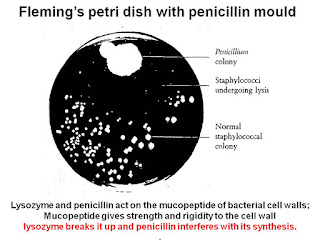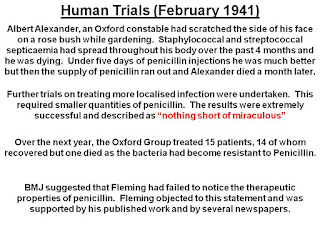Of all the Scottish inventors that I have talked about, I found Alexander Fleming the most fascinating. Scotland is a small country of barely five million people but for its size, the list of
Scottish Nobel Prize winners is very impressive. Fleming's discovery of antibacterial compounds like lysozyme and penicillin ushered the antibiotic age and changed the way infectious diseases are treated. It is ironical that if it were not for the second world war, large scale penicillin production would have been delayed by decades and mankind would have suffered the curse of bacterial diseases a lot longer. The story of penicillin is also a reminder of human failings - as a species we seem to be unable to plan, understand and appreciate things that are important to us and fall in bad practices. The abuse of antibiotics, despite warnings by Fleming and others, has now resulted in the prevalence of drug-resistant bacteria which are threatening to undo all that we had gained from Fleming's remarkable work. I have discussed some of this in my blog
On Microbial Antagonism, Antibiotics and Antibiotic Resistance.
In the following I am publishing the slides of my lecture at Strathclyde University in July 2014 - it is the story of a quiet, dour, chain-smoking Scot who was thrown into the public arena by his discovery of penicillin and became one of the most influential person respected by everyone.
(Click on a slide to see its bigger image)
The following slide shows the History of bacterial diseases - added to this is some timeline of emergence of resistant strain of bacteria.
New methods to control drug-resistant bacteria are being researched and some promising results have been obtained.
One such method has been successfully tried . I hope that the new technologies will provide us with a comprehensive array of weapons to fight infectious diseases.





























































No comments:
Post a Comment